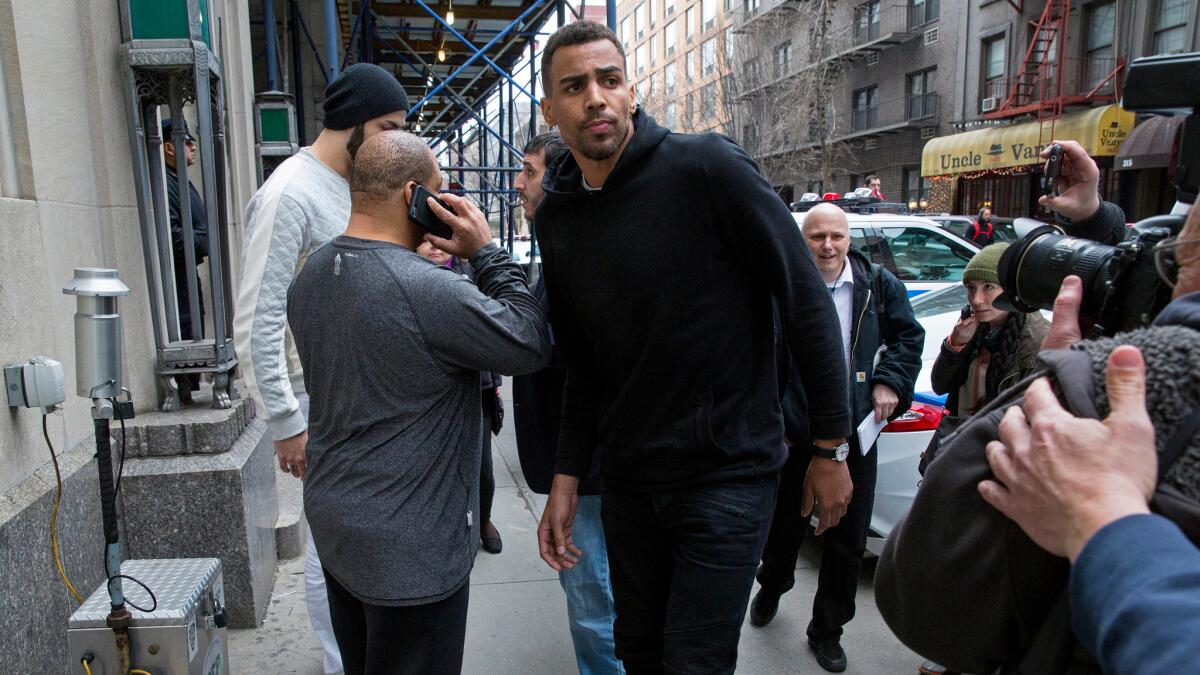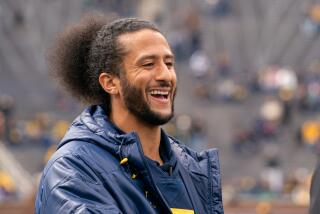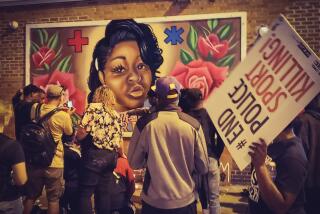Opinion: Colin Kaepernick’s wealth and fame don’t protect him from police brutality. Here’s proof

When the San Francisco 49ers take the field to play the San Diego Chargers Thursday night, all indications are that their quarterback, Colin Kaepernick, will stay seated during the national anthem in protest of police brutality against African Americans.
Kaepernick, who is half-black, has faced criticism for this decision from all directions — most of it silly and reductive, some of it outright racist. Arguably the most deceptively noxious critique of Kaepernick, however, also happens to be the most common: The quarterback is rich and famous, and therefore has nothing to complain about. Police brutality clearly isn’t an issue for him, so he should shut up and dab tears away from his eyes every time he sees the flag, in gratitude for all it has given him.
Not only is this line of criticism intellectually vacant and generally hypocritical—more often than not it comes from entitled media commentators like Sean Hannity, who, despite wealth and fame on a par with Kaepernick’s, continues to devote his life’s work to complaining, loudly and obnoxiously, about everything — it is obviously, painfully, demonstrably wrong.
Being a famous athlete may shield you from police brutality and malfeasance if you’re, say, a white quarterback with a notorious substance abuse problem — but there are no guarantees if you’re black.
Here is just a partial list of black athletes who have been beaten, shot, harassed or wrongly accused by police in recent memory. Keep in mind, these are the incidents I was able to remember off the top of my head, or find with the assistance of some cursory Googling. There are undoubtedly more.
San Diego is an appropriate place for Kaepernick’s protest Thursday night, because in 2006 then-Chargers linebacker Steve Foley was shot multiple times by an off-duty police officer who pulled the player over for speeding and erratic driving but failed to flash a badge. Foley, thankfully, lived, and was awarded a $5.5-million civil compensation.
Other players weren’t so lucky. In 2013, former Florida A&M University football player Jonathan Ferrell was shot 10 times by police in North Carolina while seeking help in the wake of a car crash. Investigators determined the officer responsible for the shooting “did not have a lawful right to discharge his weapon during this encounter.” The officer was charged with involuntary manslaughter, but was never convicted after he claimed in court that Ferrell had tried to grab his gun.
Two years earlier, former Cincinnati Bengals running back David Lee “Deacon” Turner was shot and killed by police after stopping to buy beer in a convenience store in Bakersfield. His two sons, 19 and 16, were with him. Police were responding to a call that someone had been buying booze for minors.
More recently, at least five NYPD officers helped snap Atlanta Hawks forward Thabo Sefolosha’s leg and tear ligaments in his ankle during a wrongful arrest outside a Manhattan nightclub last year. Sefolosha is suing the department for wrongful arrest and police brutality — which is a good thing, because this is a department that clearly doesn’t learn its lesson easily.
Just one month before Sefolosha’s beating, NYPD officers made international news by tackling tennis star James Blake and kneeing him in the back — as he stood calmly smiling in broad daylight in front of his Manhattan hotel.
Despite being on a the lookout for a “mixed race” man in his 50s with a salt-and-pepper goatee, police in Fort Myers, Florida decided to detain Oakland Raiders defensive back Nate Allen for nearly six hours last year.
Olympic gold medal-winning track star Al Joyner was falsely arrested not once, but twice on the same day in Los Angeles in 1992 as he was training for that year’s Games. The first time, he was handcuffed and forced to lie on the ground at gunpoint by LAPD officers in Hollywood who believed his car he was driving was stolen. Moments after being released, he was arrested again for a hit and run he didn’t commit.
There’s the story of Robert Tolan, the son of former MLB player Bobby Tolan, who was shot by police on the porch of his parents’ suburban Houston home in 2008. Police pegged the younger Tolan for a car thief — and fired three bullets in his direction, striking him once, as he protested their mishandling of his mother, who was trying to clear up the situation. The bullet lodged in Tolan’s liver, ending his prospective baseball career before it ever started.
And then there’s Boston, a city black players have dreaded for decades due to its overt racial animus and history of shady police interactions. In 1990, Celtics rookie Dee Brown was welcomed to his new suburban Boston community at the local post office by nine police officers, guns drawn, who thought he was a bank robber.
Now, mind you, Colin Kaepernick has in no way said he is taking this stand in his own self-interest. His stated intentions are far more altruistic — he’s speaking out against police brutality on behalf of the millions of blacks who are potential victims of the implicit bias and excessively violent tactics that infect some police departments, and lack the megaphone he has.
But make no mistake, no matter how rich and famous he is, Kaepernick isn’t immune to these forces. And neither is his family.
Follow the Opinion section on Twitter @latimesopinion and Facebook
More to Read
A cure for the common opinion
Get thought-provoking perspectives with our weekly newsletter.
You may occasionally receive promotional content from the Los Angeles Times.











